Rachel Klein flips vegan fine dining at Miss Rachel’s Pantry
Tucked away on a South Philadelphia side street behind a glass garage door is Miss Rachel’s Pantry, a fine dining experience in a category of its own.
Chef and owner Rachel Klein–who recently Beat Bobby Flay–cooks up masterful plant-based courses three nights a week. We talked to her how the Pantry flips fine dining on its head.
Tell us about Miss Rachel’s Pantry
We are a vegan restaurant that operates a lot like a supper club. We book a month plus in advance so we know exactly how many people are dining with us each night–which reduces surprises and food waste.
Guests come in and experience five courses. We always start off with our homemade biscuits. We really focus on vegetables, rather than relying on pre-made or fake meats. We’re not opposed to them, it’s just not the thing we do here! There are simply so many cool things you can do with vegetables.
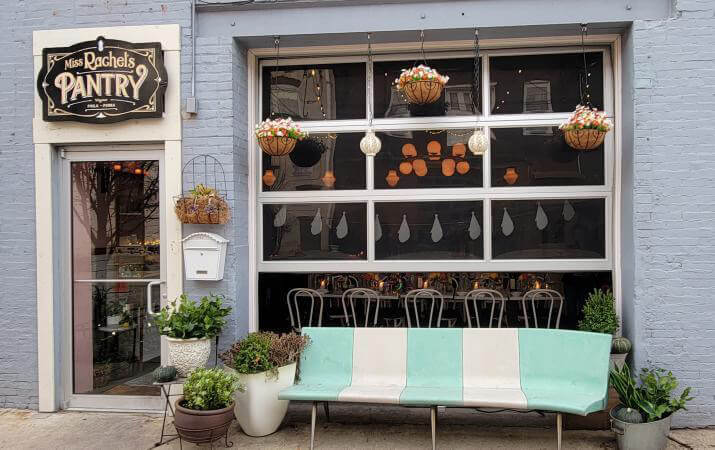
Pantry exterior, courtesy of Rachel Klein
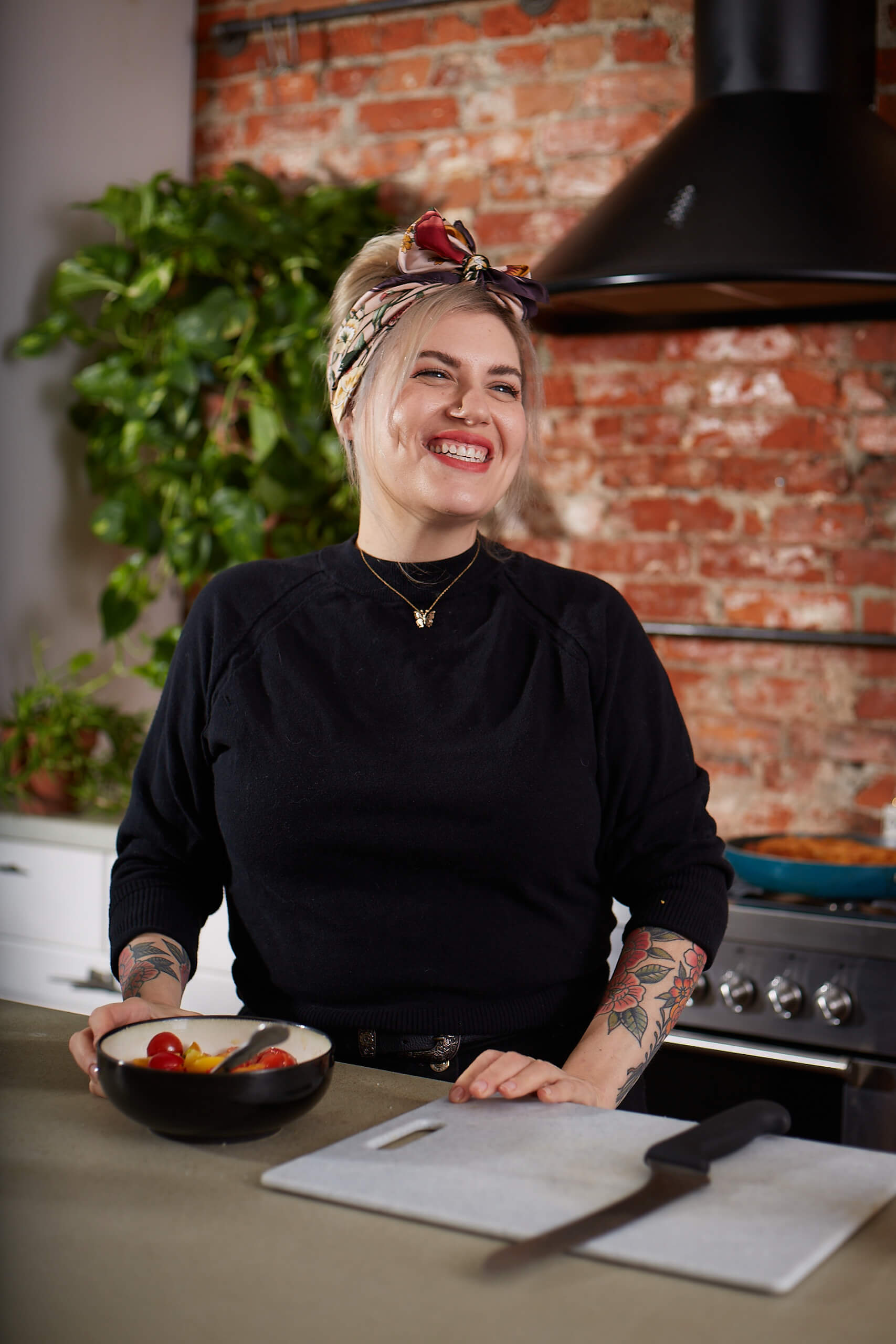
Rachel Klein, courtesy of Scott Kinkade
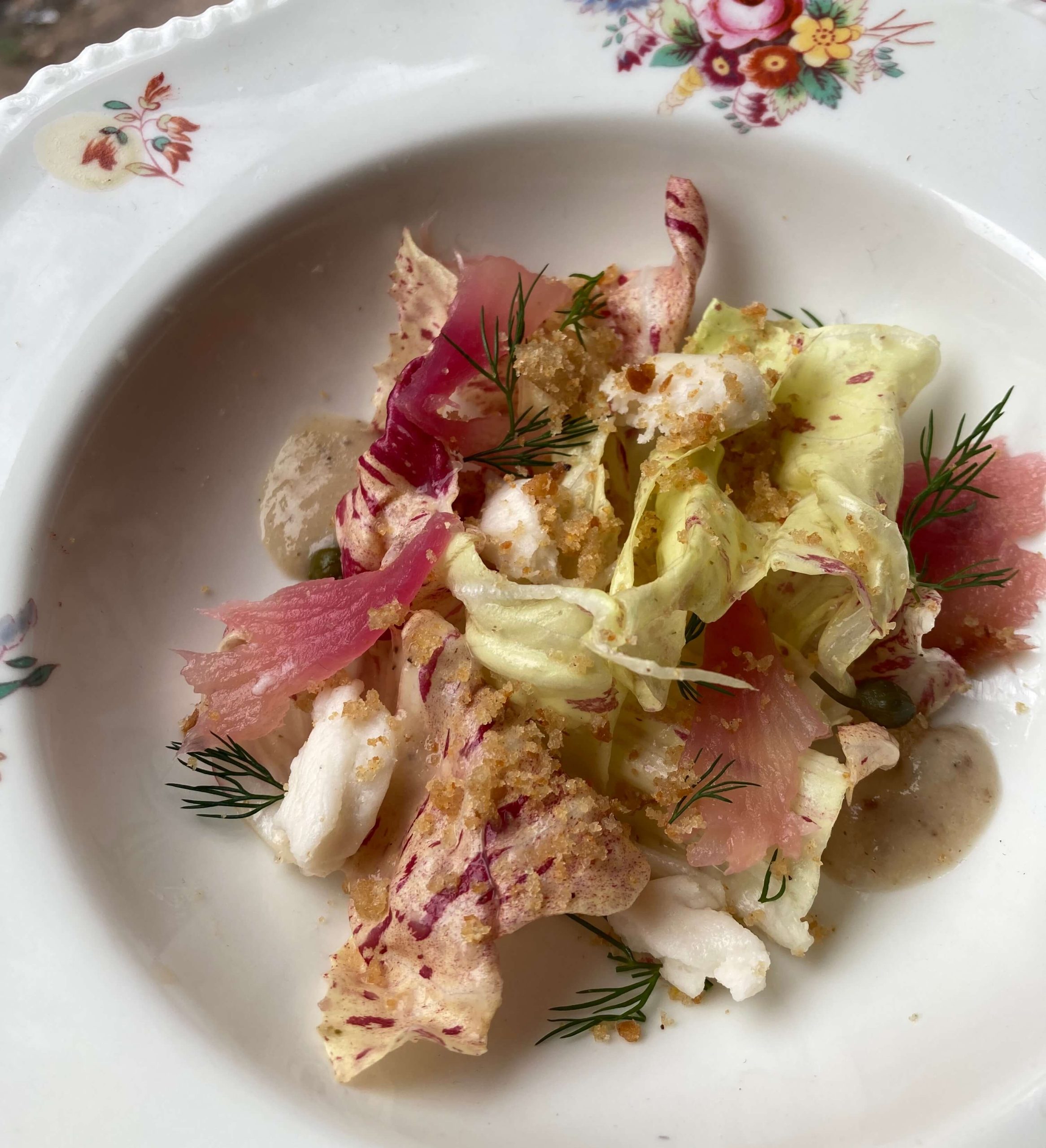
A particularly beautiful green salad, courtesy of Rachel Klein
Where does your motivation come from? Why is plant-forward eating—and thinking—important to you?
From kindergarten I declared I would not eat anything with a face, and I still stand by that. As someone who spent many years as a vegetarian before becoming vegan, for me, shock or scare tactics – such as slaughterhouse exposés – weren’t something I could stomach so I didn’t pay attention to them.
Our approach at the Pantry is in some ways informed by a resistance to scare tactics. Insead, showing people how good a truly plant-based meal can be is a way to pave a path to veganism. It’s a softer approach, it’s gentle, and everyone eats! A fine dining experience tastes good, and doesn’t hurt or cause pain.
And for me, growing up in a Jewish family, food is love. “Let me share something lovely for you to eat” can be a version of how we enact our values when the food is plant-based.
A lot of people who come to the restaurant are not vegan. It’s often that one half of a couple is vegan and brings their omnivore partner. We get a lot of comments along the lines of “I’m a big carnivore, but this was awesome” and that is a win. We want people to know that this kind of vegan world exists, and it’s really good.
In your view, how does the food we serve on our plates reflect our cultural norms?
We are a global community and we learn from each other. A recent example—we had a big quinoa boom in the US where all of a sudden, everyone is eating quinoa but people aren’t making quinoa as a nod to the places it comes from, mostly in South America. It’s very important that we learn and grow and borrow ingredients in ways that pay homage to their roots without appropriating.
That said, it would be a very boring world if only Italian people cooked Italian food. We can learn from one another and I think there’s a right way to do it. Vegan food in particular is so inventive and creative, and leaning on new and exciting spices or marinades from various cultures is an opportunity to create something new. When I’m looking for inspiration, I might explore the aisles of our local Asian grocery store and think, “Hmm. I respect this culture, I like the food they make, and lemongrass might really complement what I’m making right now so I’m going to incorporate that because it’s accessible to me here.”
There’s a line to toe to be respectful of other cultures. And honestly, Jewish food is not the best starting point from which to craft a five course menu, so to me it’s imperative to branch out! Borrowing flavors and influencing each other culinarily is a great thing. One of my go-to spots in Philadelphia is called Bing Bing Dim Sum, and they do a fusion that includes Thai, Vietnamese, and even a Jewish influence. It’s really cool that cultures can come together to create food we haven’t had before but still have familiar flavors. I love a riff on a classic, too.
What norms, myths, or stereotypes are you challenging at the Pantry?
Vegan food has long had a perception of being “crunchy granola,” and we’re moving away from that. Not just the food itself, but the way that food is presented.
We take a more gentle approach to presenting our restaurant as vegan. It’s not in your face—there are no air quotes around menu items suggesting a dish is meant to be “pulled pork”—for example, and nothing on the menu even says the word vegan or plant-based even though you know that’s what you’re getting.
We really put a lot of thought and care into this approach, and are here to make a nice time for our guests. It certainly challenges stereotypes to prove that you don’t need to have animal protein to have a fine dining experience. It’s simply nice food in a nice atmosphere where people feel taken care of.

Rachel Klein mid-cooking demo, courtesy of Rodger Holst
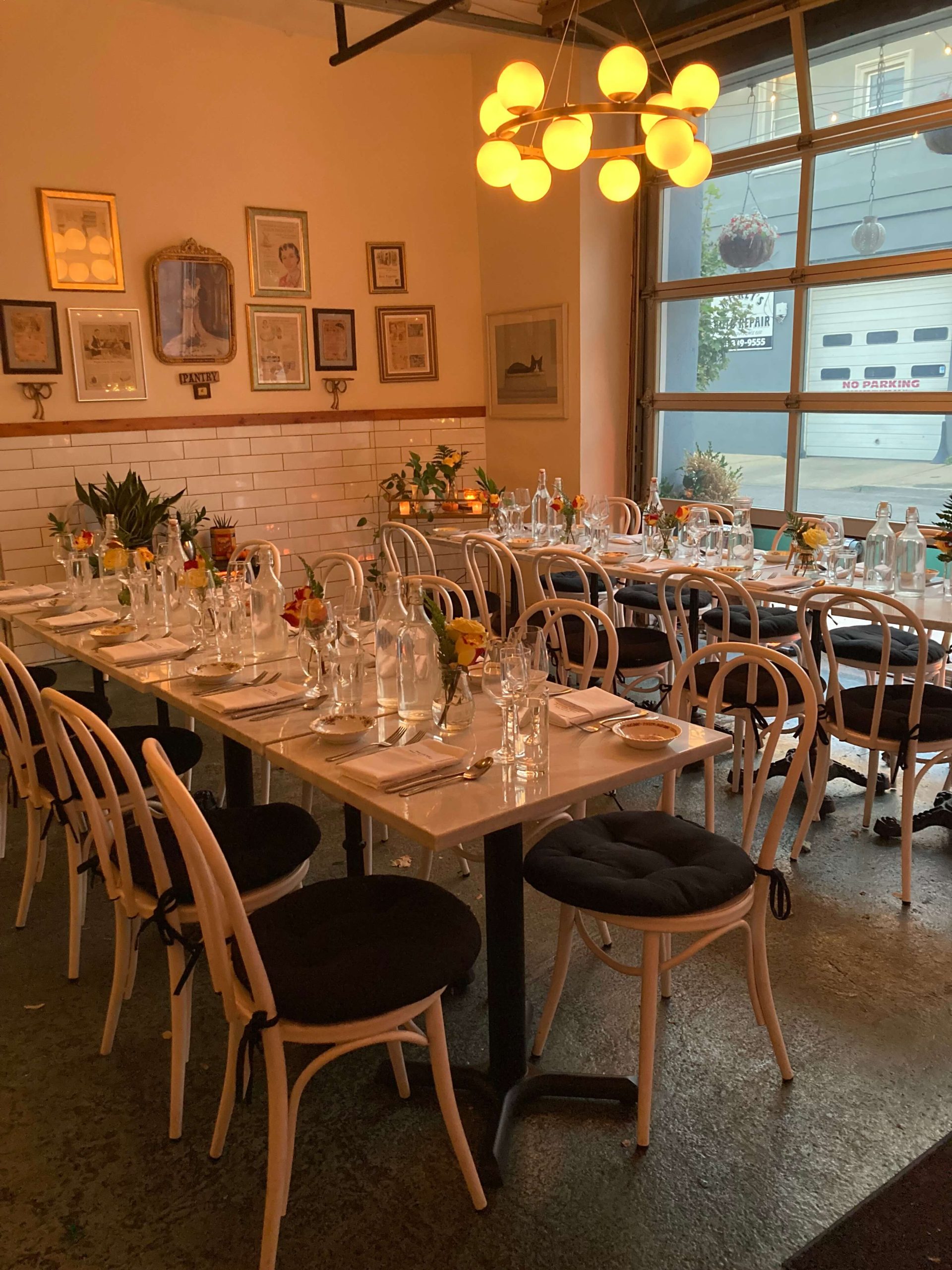
A private wedding at the pantry, courtesy of Rachel Klein
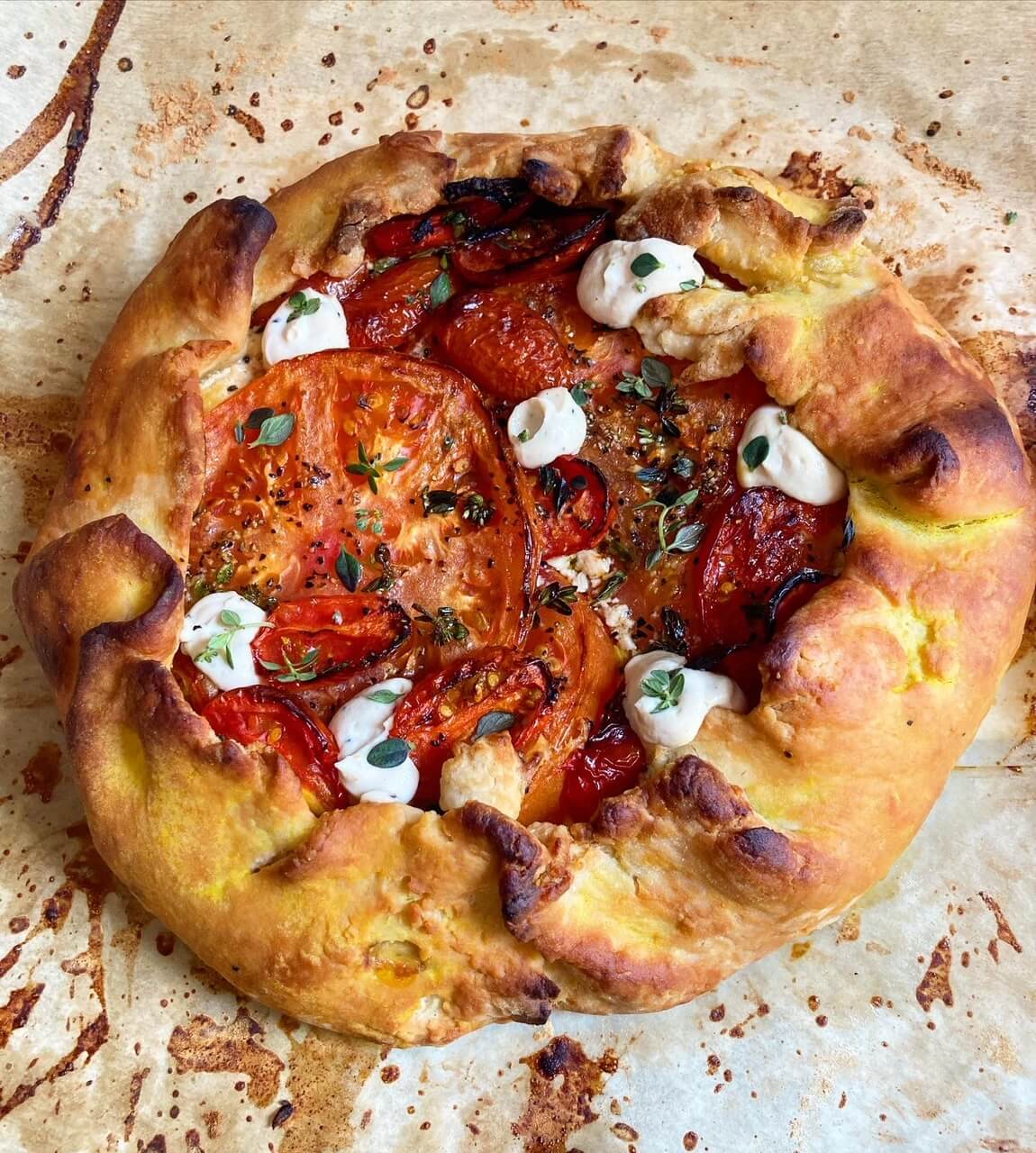
Tomato and macadamia goat cheese galette, courtesy of Rachel Klein
You recently Beat Bobby Flay. What does that mean for you in terms of vegan representation on a greater scale?
You know, one day in the future I hope that a vegan competition doesn’t have to be its own episode! That instead, a chef who just so happens to cook vegan food can beat out an omnivore chef.
But it opens up a whole new world, especially when you think about who watches cable television–and it’s the masses, not necessarily those of us who live in progressive niches. So that’s really cool to think about…that a decision to do a vegan episode was made because it was determined that mainstream America is ready to enjoy and relate to having vegan chefs on primetime television.
What does a fully plant-based world’s culture look like? In other words, if everyone started eating a plant-based diet, how would (or should) other cultural norms start changing as well?
I’d hope that people might start looking at animals in different ways. One of the major reasons I’d never eat dairy again, is that it bothers me that animals are commodities. People care so much about life but not that other beings are forced to be here for others to make money. So I’d hope it can shift the way people view all beings.
I would also hope a fully plant-based world means more resources, and less hunger. I hope that more people can be fed with the ground and the land that used to be used to feed animals.
How can other individuals and organizations start “flipping” their norms in a plant-forward direction? What resources can you provide?
It’s important that no one’s food is an afterthought. The powers that be – such as restaurants that now offer vegan options – should care as much about plant-based foods as they do about what they’re already serving.
And cooking plant-based foods is a whole different ball game. Flipping norms requires having the willingness to truly learn the thing you’re doing. It’s a matter of learning how to do it right and we’ve offered consulting for that.
One thing that’s super cool, is that once people start doing plant-based right they’ll learn all of the comprehensive benefits that come with it. For example, it’s so much safer to have a vegan kitchen, from both an allergen standpoint and shelf-life—the carton of soy milk can sit on your shelf for so much longer than the dairy in your fridge.
So in addition to making food that’s inclusive, it’s a really cool thing to learn that you’re creating a safer, more pleasant environment for your employees.
Want a taste of Pantry magic?
Get the recipe for Rachel Klein’s heirloom tomato and macadamia goat cheese galette, and learn more about Miss Rachel’s Pantry at missrachelspantry.com.